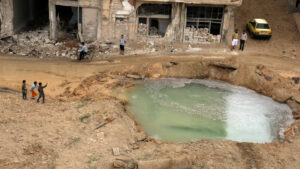The Netherlands and Canada have taken a significant step toward holding Syria accountable for its violations of international law during the ongoing war. The two nations jointly filed an application before the International Court of Justice (ICJ) in The Hague, accusing Syria of breaching the UN Convention against Torture and other cruel treatment. the use of chemical weapons, the mistreatment of detainees, and numerous other violations. The countries have requested urgent measures, seeking the release of arbitrarily detained prisoners and access to detention centers by international monitors.
A Long Road to Accountability:
The conflict in Syria, which erupted in 2011 following Bashar al-Assad’s crackdown on pro-democracy protests, has been marred by devastating human rights abuses. With over 500,000 lives lost, and countless individuals tortured, murdered, and forcibly disappeared, the Netherlands and Canada are determined to seek justice for the victims of these atrocities. Dutch Foreign Minister Wopke Hoekstra emphasized that bringing the case before the ICJ marks a significant milestone on the path toward accountability for the war’s horrors.
Allegations of Abhorrent Treatment:
In their application to the ICJ, the Netherlands, and Canada presented a litany against Syria, accusing Bashar al-Assad of committing numerous violations of international law since 2011. These violations include abhorrent treatment of detainees, inhumane conditions in places of detention, enforced disappearances, sexual and gender-based violence, violence against children, and the use of chemical weapons. The use of chemical weapons, in particular, has been a reprehensible tactic employed by the Syrian regime, resulting in numerous deaths, injuries, and severe physical and mental suffering among the civilian population.
Syria’s Denials and Contradictions:
While Syria has consistently denied allegations of using chemical weapons, international investigations by the world’s chemical weapons watchdog have found evidence to the contrary. The repeated use of chemical weapons by the Syrian military against its own people has only intensified the urgency of bringing the case before the ICJ. The Netherlands and Canada firmly contend that the violations committed by Syria constitute severe breaches of international law and demand immediate action.
Seeking Justice and Humanitarian Measures:
Canada and the Netherlands have called upon the ICJ to intervene and order Syria to cease and prevent all acts contributing to torture, cruel treatment, and inhumane punishment. They have also demanded the cessation of arbitrary detentions and the release of unlawfully detained individuals. In addition, the countries have urged Syria to reveal the burial sites of those who died in detention and to preserve any evidence, including medical records, that may assist in shedding light on the extent of the atrocities committed.
Awaiting Damascus’s Response:
As the case unfolds, the international community eagerly anticipates the response from the Syrian government. While immediate reactions from Damascus have not yet been reported, the proceedings before the ICJ underscore the growing demand for accountability and justice. The Netherlands and Canada’s joint application serves as a testament to their commitment to bringing an end to the culture of impunity and ensuring that the victims of the Syrian conflict find solace and closure.
The Netherlands and Canada’s decision to approach the International Court of Justice regarding Syria’s violations of international law represents a crucial step in the pursuit of justice. By seeking accountability for the atrocities committed during the Syrian war, these nations aim to shed light on the suffering endured by countless Syrian citizens. As the proceedings unfold, the world watches with anticipation, hopeful that the ICJ will play a vital role in addressing the grave human rights violations that have scarred the Syria for far too long.


